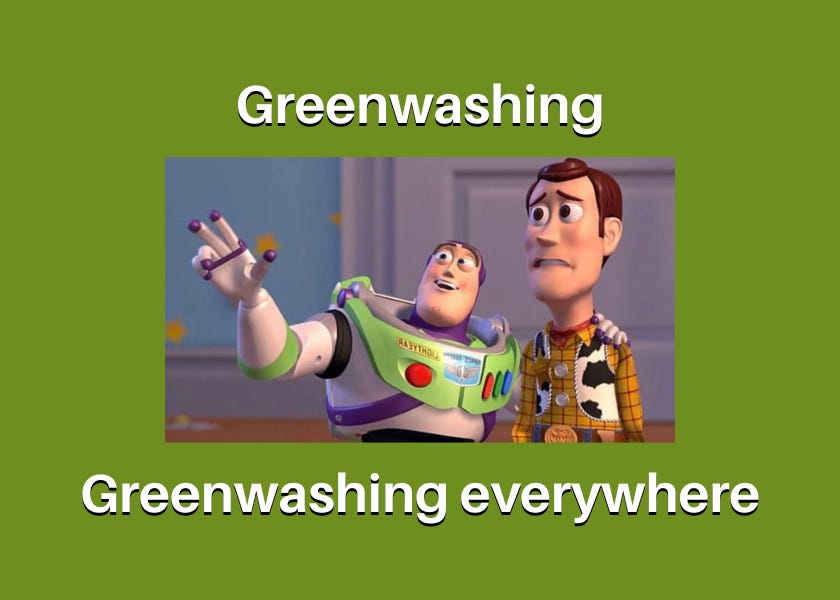Mind over matter: Are we programmed to fall for greenwashing?
Spoiler alert: sustainability isn't just about the materials we use; it's also about consumer habits and awareness.
Admit it, we all judge a book by its cover.
Or in this case, a product by its packaging.
When we stand in the aisles of stores, our eyes are naturally drawn to sleek, eye-catching packaging designs. We can’t help it — our brains are wired to respond to attractive visual cues.
It’s fascinating how packaging does so much more than simply contain the product. It acts as a silent salesperson, with a first impression that can either make or break a sale.
A packaging’s colours, shapes, fonts and even its materials’ textures all work together to whisper (or sometimes shout) a message to us. And let me tell you, that message can hit us right in the feels.
Take those minimalist, eco-friendly-looking packages. They're not just boxes; they're storytellers. With their paper-like materials and earthy colors, they seem to exclaim, "Hey, I'm honest, I'm elegant, and I care about the planet." And just like that, we're forming an emotional bond with a product we haven't even tried yet.
Pretty powerful stuff, huh?

We spend all this time talking about materials and recycling systems, which are important, don't get me wrong. But what about a consumer’s behaviour?
We can have the most eco-friendly packaging in the world, but if we don't change our excessive and unnecessary shopping habits, what's the point?
The visual bias: When packaging tricks the eyes
Let's talk about a fascinating phenomenon in the world of packaging: the visual bias that makes us think something is eco-friendly when it's actually not.
It’s an optical illusion, really!
👀 Let’s do a quick test on ourselves:
You probably chose the right one.
But unfortunately, that’s not the correct answer.
You’re not alone! Participants in a study made the same choice.
There’s a study that reveals that when plastic packaging includes elements of paper, we tend to perceive it as more environmentally friendly than plastic-only packaging.
This effect, known as the PEF (Perceived Environmental Friendliness) bias, is so strong that it persists whether the plastic is visible upfront or revealed later.
Interestingly, this bias strengthens as the proportion of paper in the packaging increases. It's also more pronounced in individuals who strongly believe in the "paper = good, plastic = bad" concept.
But here's a kicker: simply adding a simple "minimal packaging" sticker to plastic packaging can boost its perceived eco-friendliness.
This visual bias isn't just a curiosity—it has real-world implications. It can influence our willingness to pay for products and even sway our choices at the checkout.
We tend to demonise plastic so much. However, plastic makes up less than 1% of materials used and waste produced, so eliminating it wouldn’t solve our waste problem.
Are we complicit in our own greenwashing?
We’ve all fallen victim in some way to the paper-plus-plastic overpackaging trend.
The study showed that consumers are eating it up, choosing these overpackaged products and even willing to pay more for them.
Plastic wasn't chosen for packaging because it was an environmental superhero. It was all about preservation, durability, and distribution—and we simply didn't know better back then.
But now? Now we're at a crossroads.
We need to think outside the box (pun intended) and come up with solutions that work for both our planet and our economy.
Look beyond the surface and recognise that not all "green" options are created equal. Is it genuinely sustainable, or are you simply falling for the visual bias?
So let's challenge ourselves to break free from these biases and embrace informed consumption.
Our collective actions can drive change. Demand transparency and accountability from brands, encourage them to prioritise sustainability in their practices.
By supporting businesses that align with our values, we can create a market where eco-friendly options thrive.
💡 If you enjoyed this newsletter, check out the spooky side of Halloween is the waste it produces and why circular economy benefits businesses.
Depressed about the US election? We’ll have a full scoop on it next week — stay tuned!
If you haven’t yet, join the circle by subscribing to our newsletter. Found this issue interesting? Help us widen our circle by sharing our newsletter with your social networks! Comments are appreciated and welcome.



